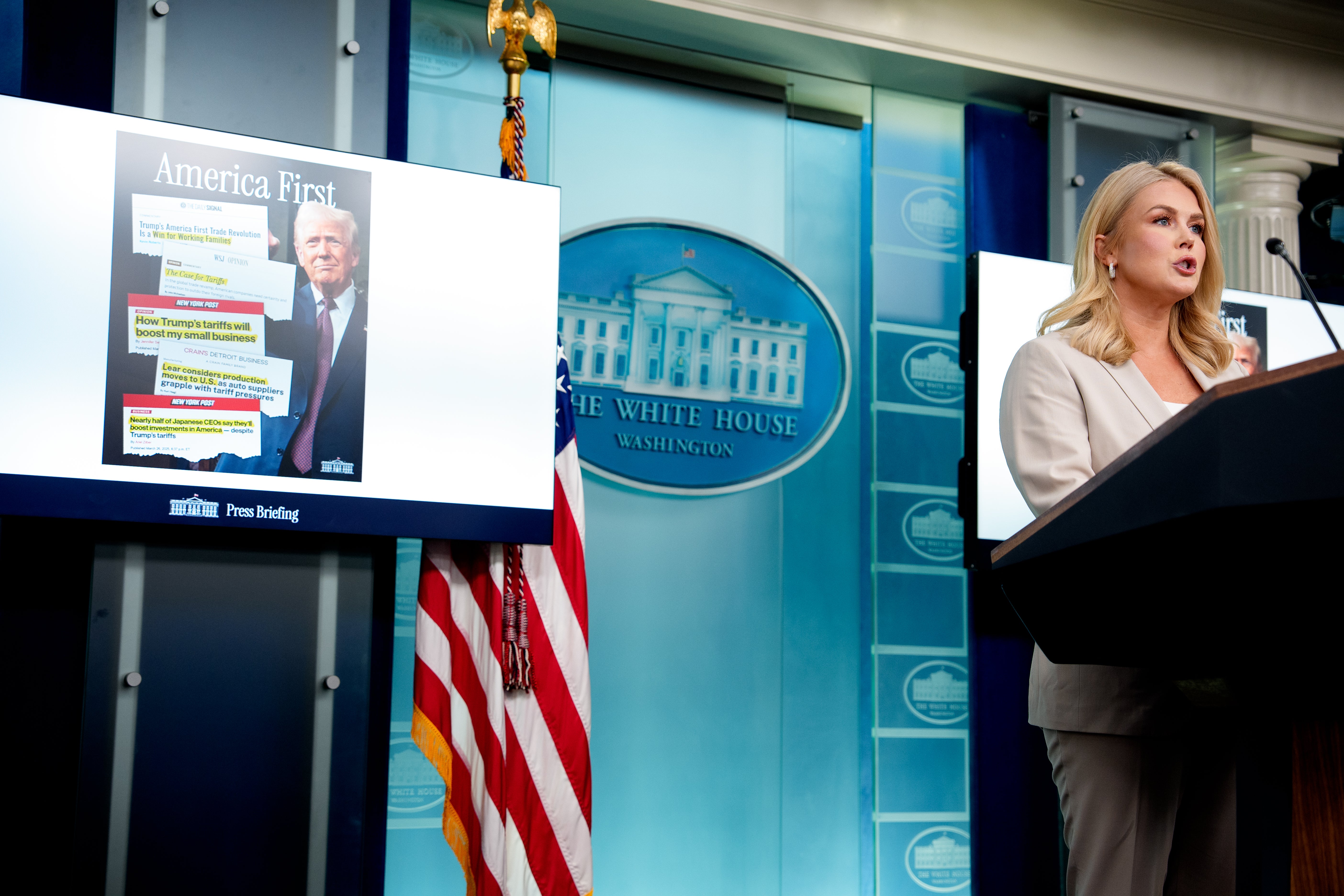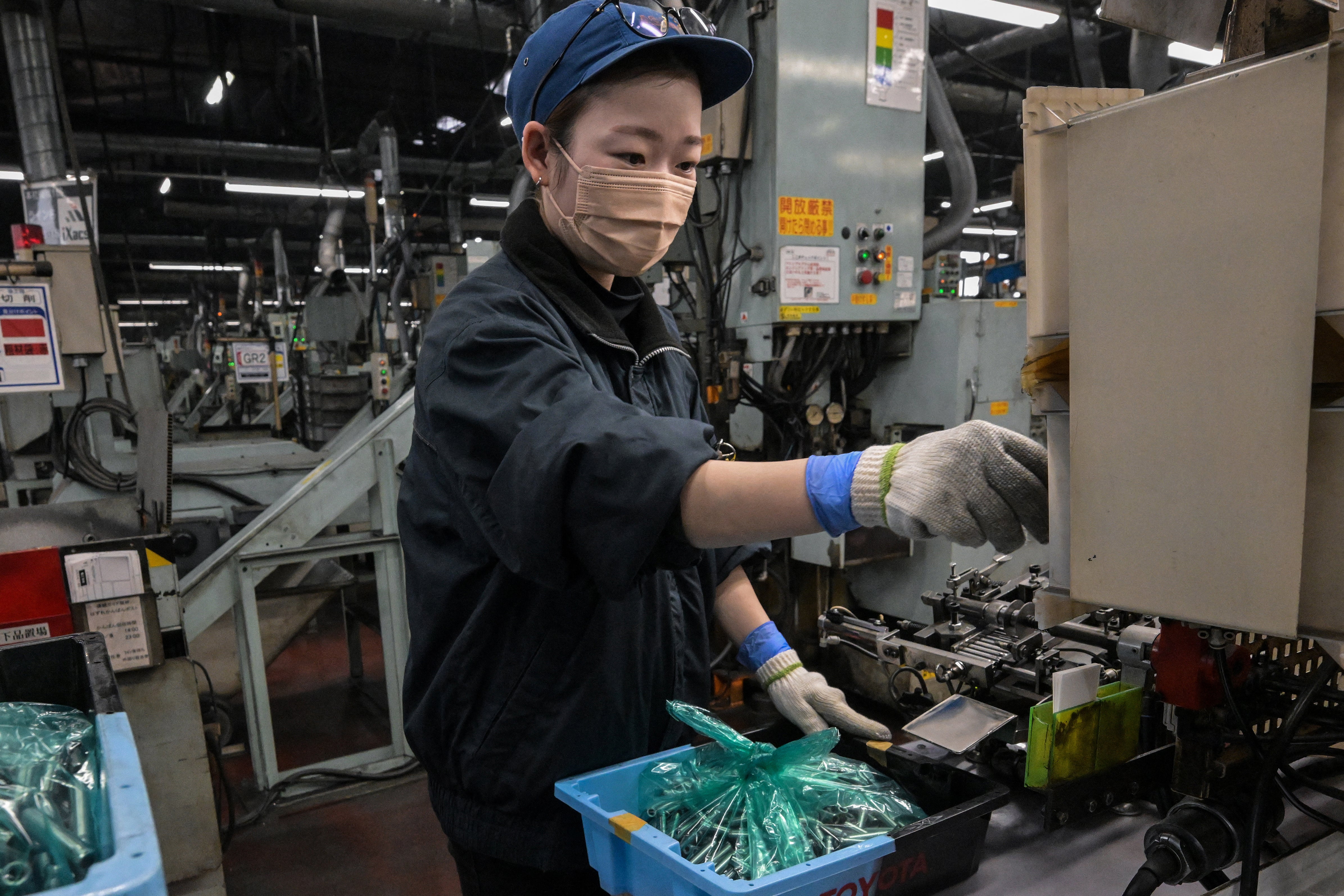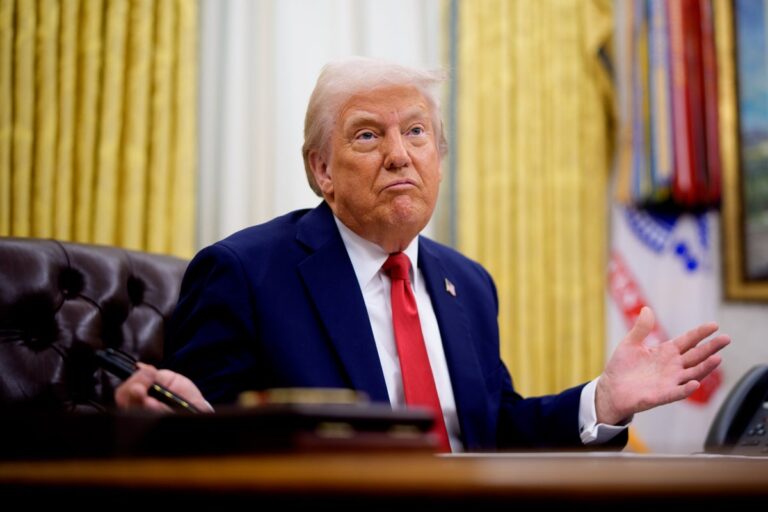Your support helps us to tell the story
From reproductive rights to climate change to Big Tech, The Independent is on the ground when the story is developing. Whether it’s investigating the financials of Elon Musk’s pro-Trump PAC or producing our latest documentary, ‘The A Word’, which shines a light on the American women fighting for reproductive rights, we know how important it is to parse out the facts from the messaging.
At such a critical moment in US history, we need reporters on the ground. Your donation allows us to keep sending journalists to speak to both sides of the story.
The Independent is trusted by Americans across the entire political spectrum. And unlike many other quality news outlets, we choose not to lock Americans out of our reporting and analysis with paywalls. We believe quality journalism should be available to everyone, paid for by those who can afford it.
Your support makes all the difference.
Read more
Donald Trump is hailing “liberation day in America” before rolling out still-unannounced “reciprocal” tariffs on imported goods shortly after markets close on Wednesday.
It still remains unclear, exactly, what the administration is planning, or how new trade barriers will impact the economy and costs of everyday goods as Americans grapple with an uneasy market and a looming affordability crisis, with an escalating trade war that is expected to have a damaging economic ripple effect.

open image in gallery
Roughly 24 hours before Wednesday’s announcement, White House press secretary Karoline Leavitt said the president and his team were still “perfecting” the new policy.
Trump has already announced his intention to roll out tariffs on imported automobiles and auto parts and has suggested incoming charges are “reciprocal” with other countries, potentially targeting the production of pharmaceutical products and computer chips, among other other goods.
Administration critics and most economists have repeatedly argued sweeping tariffs are ultimately a tax on Americans, as importers and retailers are likely to hike prices to compensate for the levies they face.
What has Trump said about tariffs?
Trump has called the word “tariff” the “the most beautiful word in the dictionary.” The president and administration officials argue a flood of imports has threatened American industries, and that a tax on those products would incentivize companies to open factories and other manufacturing hubs in the United States to avoid tariffs.
“They’re about protecting the soul of our country,” the president said in his remarks to Congress last month. “Tariffs are about making America rich again and making America great again.”
Most economists agree Trump is relying on an outdated — and self-defeating — nationalist economic perspective. Trump even conceded that there will be “a little disturbance” in the economy, but “we’re OK with that” because “it won’t be much,” he said in his speech to Congress.

open image in gallery
Trump and officials have repeatedly claimed that tariffs on imported goods will result in lower prices for Americans. When a reporter with the Associated Press asked Leavitt about Trump’s tariff plan last month, Leavitt falsely claimed “tariffs are a tax cut for the American people.”
“I’m sorry, have you ever paid a tariff? Because I have. They don’t get charged on foreign companies. They get charged on the importers,” the reporter responded.
Leavitt called his question “insulting.”
“When we have fair and balanced trade, which the American people have not seen in decades, as I said at the beginning, revenues will stay here, wages will go up and our country will be made wealthy again,” she said.
Pressed this week on whether tariffs are the right move, Leavitt said: “They’re not going to be wrong … It is going to work.”
Hours before Trump’s announcement, with scant details available, Small Business Administration chief Kelly Loeffler told Fox Business that “liberation day” is “the single greatest salvation, for not just small businesses, but for America.”
Trump’s retaliatory tariff scheme amounts to a “reckless escalation that will undermine U.S. national interests, alienate allies, and deepen economic insecurity for American workers, consumers, and small businesses,” according to Robert Weissman, co-president of Public Citizen, which has joined several legal challenges against the administration.
“For decades, corporate-rigged trade deals have offshored jobs, stagnated wages, and put investor profits over public interests, but these tariffs are not about reversing that damage,” he added. “They’re about weaponizing trade policy to advance the narrow interests of fossil fuel giants, Big Tech companies, and Trump’s billionaire cronies — while distracting from the administration’s utter failure to deliver a coherent, worker-centered trade agenda.”
What countries and products are expected to be impacted?
Sweeping tariffs against America’s largest trading partners could significantly drive up the costs of oil and gas, sugar, fresh fruits and vegetables, clothing, construction material and automobiles and auto parts, The Independent has reported.
Since taking office, Trump has repeatedly threatened tariffs on a range of goods, only to postpone them indefinitely or call them off after reaching deals with targeted nations.
Trump’s tariff threats have specifically targeted goods from Canada, China and Mexico, claiming that officials there are not adequately combating illegal immigration or movement of fentanyl into the United States. Trump imposed 25 percent tariffs on Canada and Mexico, though they have been paused twice, a 10 percent tariff on China, and a 25 percent tariff on aluminum and steel.
He has also floated massive tariffs on European alcohol, and a 25 percent tariff on all imports from countries that buy oil or gas from Venezuela is set to take effect this month.

open image in gallery
Trump backed off 25 percent tariffs on Colombian goods after the country agreed to receive deportation flights from the United States, and he withdrew a plan for a 25 percent surcharge on electricity exports from Ontario after Canada agreed to suspend its charges.
In remarks from the Oval Office, Trump said he was imposing a 25 percent tariff on all cars coming into the country, which the White House later clarified would apply to foreign auto parts even if the vehicles they assembled domestically.
Imports under the United States-Mexico-Canada Agreement “will be given the opportunity to certify their U.S. content” and a 25 percent tariff “will only apply to the value of their non-U.S. content,” according to the White House.
“I hope they raise their prices because if they do, people are gonna buy American-made cars,” Trump told NBC News of foreign automakers. “I couldn’t care less because if the prices on foreign cars go up, they’re going to buy American cars.”
So are prices going up?
Most likely.
Americans could see higher costs for some goods — like perishable foods — faster than others. More than half of the country’s fresh fruit and nearly three-quarters of its vegetables came from Mexico in 2022, according to the Department of Agriculture.
The United States imports more cars and car parts from Mexico than any other country, accounting for roughly 27 percent of all auto imports.

open image in gallery
“For auto dealers and their customers, already reeling from rising vehicle and parts prices, as well as high interest rates and insurance costs, these new tariffs pose an additional and unwelcome challenge to affordability,” according to American International Automobile Dealers Association president Cody Lusk.
Even the already-growing costs of a simple screw have impacted supply chains for American companies that make everything from “car parts to appliances and football helmets to lawn mowers,” according to The Wall Street Journal.
Will this cause a recession?
It might.
“Recession indicator” memes aside, a number of key markers are starting to sound alarms.
Uneasy markets have been on a rollercoaster ahead of Trump’s “liberation day” announcement, with Wall Street analysts fearing the risks of a recession around the corner. Higher consumer costs risk business slowdowns as Americans pad their savings to endure a potential economic downtown.
Tariffs from both directions in the trade war — including those imposed by Trump and retaliatory measures coming from the nation’s trading partners — have rattled consumer confidence. Wall Street firms are reducing estimates for the expansion of gross domestic product, and the Federal Reserve’s favorite recession-forecasting tool is showing negative signs.
“If both businesses and consumers start to worry and pull back their spending, that is what can tip the U.S. over into a recession,” American University economist Kara Reynolds told ABC News.
Labor economist Kathryn Anne Edwards says a potential recession under the Trump administration would be “self-inflicted.”
Recessions happen — the country has endured more than a dozen over the last century — but the next one would “arguably be the only recession directly caused by White House policy,” she wrote in Bloomberg.


